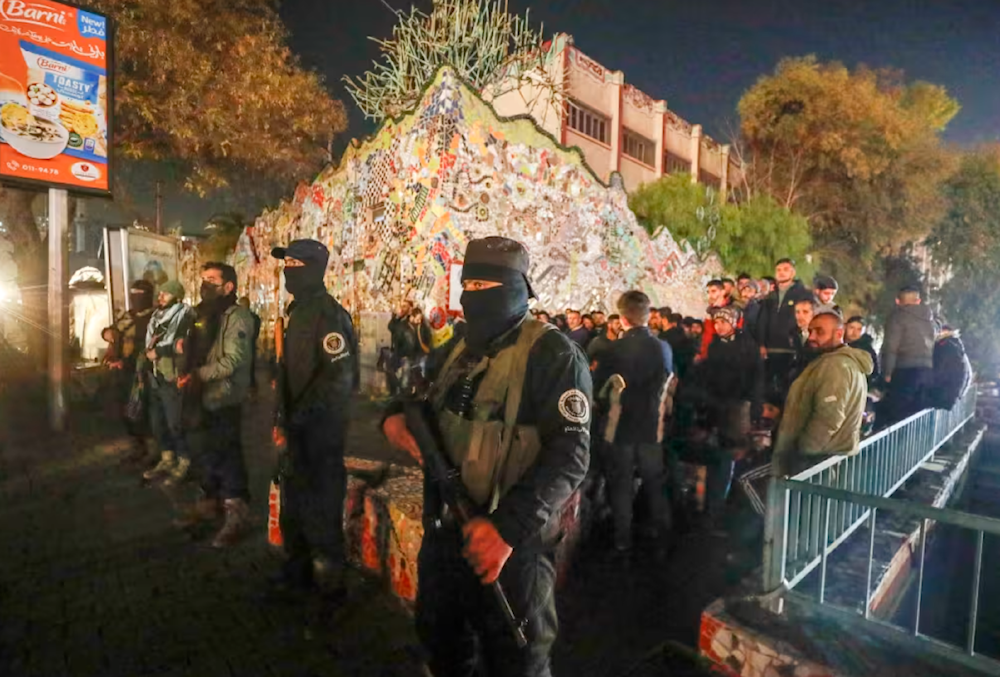Political divisions, protests renewed in Syria: WSJ
Political unrest has deepened in Syria as attacks on minorities by the new regime forces have seen an uptick.
-

Security forces of the new Syrian government secured an area in Damascus on December 25, 2024. (AP)
According to The Wall Street Journal, Syria's new government forces, led by Ahmad al-Shaara, face several problems, including fighting with former government supporters and demonstrations over the destruction of religious artifacts.
A Syria conflict monitoring group reported that 17 people were killed on Wednesday in clashes in Tartus Province, following an attempt by security forces to arrest an officer who served under the government of ousted President Bashar al-Assad, who was allegedly associated with a notorious prison.
The Syrian Observatory for Human Rights reported that "14 members of the General Security force" under Syria's new authorities were killed, along with "three armed men" in Khirbet al-Maaza, bringing the death toll up from an earlier count of nine. The forces were attempting to arrest an officer who was among "those responsible for the crimes at Sednaya prison."
On Tuesday, a demonstration in Masyaf, in northwestern Hama, condemned the killing of three judges from the Alawite sect. Protesters called for unity and accountability for those responsible. During the protest, foreign armed individuals attempted to forcibly disperse the crowd, sparking tension, which led local elders to step in to prevent clashes. The judges were killed at the Rabia-Masyaf junction amid ongoing unrest across Syria.
Additionally, a video surfaced showing armed men attacking the Alawite sect's shrine in Aleppo, resulting in the deaths of five attendants, the mutilation of their bodies, and the shrine's destruction. The video was later claimed to be from a prior incident before the fall of Assad's regime.
Separate demonstrations erupted among Syria's Christian minority when military troops set a Christmas tree on fire. The new government forces later said that they had apprehended the foreign fighters responsible.
The instability shows the new government's difficulty in administering multiple constituencies that were not within its authority before overthrowing Assad, according to Nanar Hawach, a senior Syria analyst at the International Crisis Group.
According to Hawach, “HTS doesn’t have the manpower to establish control over an entire country that it came to control in a span of two weeks,” adding that the best way forward is to include local groups to govern since it is considered by many as foreign.
Firas Maalla, an Alawite who lives in a Damascus district with a high concentration of sect members says , "For now, fear governs us, and it is too early to judge HTS and how our future will turn out."
The tensions enhance the possibility of Syria entering a new battle as the happiness over the ousting of Assad phases out.
Agreement reached to dissolve factions, merge them under Syrian MoD
A meeting between the leaders of the military factions in Syria with the leader of the new Syrian administration, Ahmad al-Sharaa, resulted in an agreement to dissolve all the factions and merge them under the umbrella of the Ministry of Defense, the official Syrian news agency SANA reported, citing the military operations room and sources affiliated with the Hay'at Tahrir al-Sham (HTS) group.
Al-Sharaa said on Sunday in a press conference in Damascus with Turkish Foreign Minister Hakan Fidan, that there will be no weapons in the hands of anyone other than the new Syrian state, whether from the factions that led an offensive that ousted the government of Syrian President Bashar al-Assad or from the factions present in the regions controlled by the US-backed Syrian Democratic Forces.
He had confirmed that all military factions would be merged into a single entity under the control of the Ministry of Defense in the new Syrian army.
Al-Sharaa also appointed Murhaf Abu Qasra, formerly known as Abu Hassan al-Hamwi, as defense minister in the interim Syrian government.

 4 Min Read
4 Min Read








